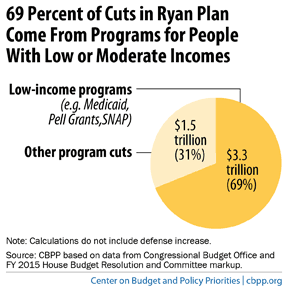This week, “Arguments” featured an introduction, some thoughts on the new torture report and the questions it raises for American law, and a warning about mass incarceration’s threat to American democracy. Before the weekend hits, here’s a quick roundup of essential context on other items in the week’s news—featuring unhappy billionaires and Paul Ryan’s message to hungry schoolchildren.
The same day the White House announced over seven million sign-ups for health insurance under the Affordable Care Act, House Budget Chairman Rep. Paul Ryan again called for repealing the law entirely—as part of his new budget, which would cut federal spending by $5 trillion over the next ten years.
Where are those cuts coming from? A new analysis from the Center on Budget and Policy Priorities shows that at least 69 percent—and maybe more—will come from programs benefiting low-income Americans. This is money that would otherwise go to things like health care, food stamps, Pell grants, and school lunches.
That last item has become closely associated with Ryan, who recently defended his worldview by telling a badly mangled story about a poor young boy who didn’t want a free government lunch at school. He wanted his own lunch, made by a parent. “The left is making a big mistake here,” Ryan solemnly told an audience a few weeks ago. “What they’re offering people is a full stomach and an empty soul.” To fix this problem, Ryan’s budget would cut around $250 billion from school lunch and related programs.
Elsewhere in the week’s news: Wednesday’s Wall Street Journal featured an editorial by billionaire conservative mega-donor Charles Koch, who used the paper’s pages to defend himself on several fronts, including his environmental record. Of his companies, Koch declared: “EPA officials have commended us for our ‘commitment to a cleaner environment.’” There’s no link or reference here, so I decided to track down this quote’s origin myself. It’s hard to be certain, but it seems to come from this 2000 announcement, which details the Koch Petroleum Group’s agreement with the EPA to invest about $80 million in cleaner refinery technologies—“rather than wait for possible EPA enforcement action.”
That’s a direct quote from the announcement, which also notes that the deal involved Koch Petroleum paying a $4.5 million penalty. The quote that Charles Koch may have used in the Journal comes next: “In return for the company’s cooperation and ambitious commitment to a cleaner environment, EPA has offered a ‘clean slate’ for certain past violations.” [my italics] If I have the source right, I can see why he decided to leave out the context.*
In any case, there are other ways to measure commitment to a cleaner environment, which brings me to this week’s most interesting find: some fascinating new research from Drexel University’s Robert Brulle. Dr. Brulle recently finished the first peer-reviewed study of organizations that fund climate-change denialism.
Brulle discovered something intriguing: after environmentalists began to publicly criticize denial-funding groups like the Koch Affiliated Foundations, donations from those groups plummeted, and started to flow instead from vaguely named organizations called “Donors Trust” and “Donors Capital.” These latter groups are “donor-directed” foundations: They receive money from contributors and distribute it based on the contributors’ preferences. “This process,” Brulle explains, “ensures that the intent of the contributor is met while also hiding that contributor’s identity […] contributions to a donor directed foundation are not required to be made public.” Publicly recorded Koch donations declined sharply after a few years of bad PR, but around the same time, the portion of overall denialist funding coming from Donors Trust/Donors Capital grew from just three percent to nearly 25 percent.
Because of the secretive nature of these organizations, Brulle’s research can demonstrate nothing more than a correlation. But, Brulle writes, “it is important to note that a Koch run foundation, the Knowledge and Progress Fund, initiated a pattern of making large grants to Donors Trust in 2008.” Indeed, according to SourceWatch, the head of the Knowledge and Progress Fund is Charles Koch.
In his Journal piece, Koch lamented the tendency of his critics to “discredit and intimidate opponents” instead of “encouraging free and open debate.” I, too, value free and open debate, and I happened to notice that only a few weeks ago, Bill Gates recounted to Rolling Stone a conversation in which Koch seemingly agreed with him about the need to address climate change. If that’s true, these donation practices are extremely puzzling. In order to clear things up and advance the cause of open debate, I look forward to his disclosure.
*Update: PolitiFact asked a Koch spokesman for the full context and found the “commitment” line appearing in a 2009 Georgia-Pacific press release about that company’s participation in an EPA program aimed at improving fuel efficiency. The agency’s praise, according to an EPA spokeswoman, applied only to this specific program, and was “not an assessment of the entire company.” After reviewing the full context of this and other sources (including the 2000 announcement that I dug up), PolitiFact concluded that Charles Koch’s quotes in the Journal piece were used largely out of context. They were rated “Mostly False.”

Click to
View Comments